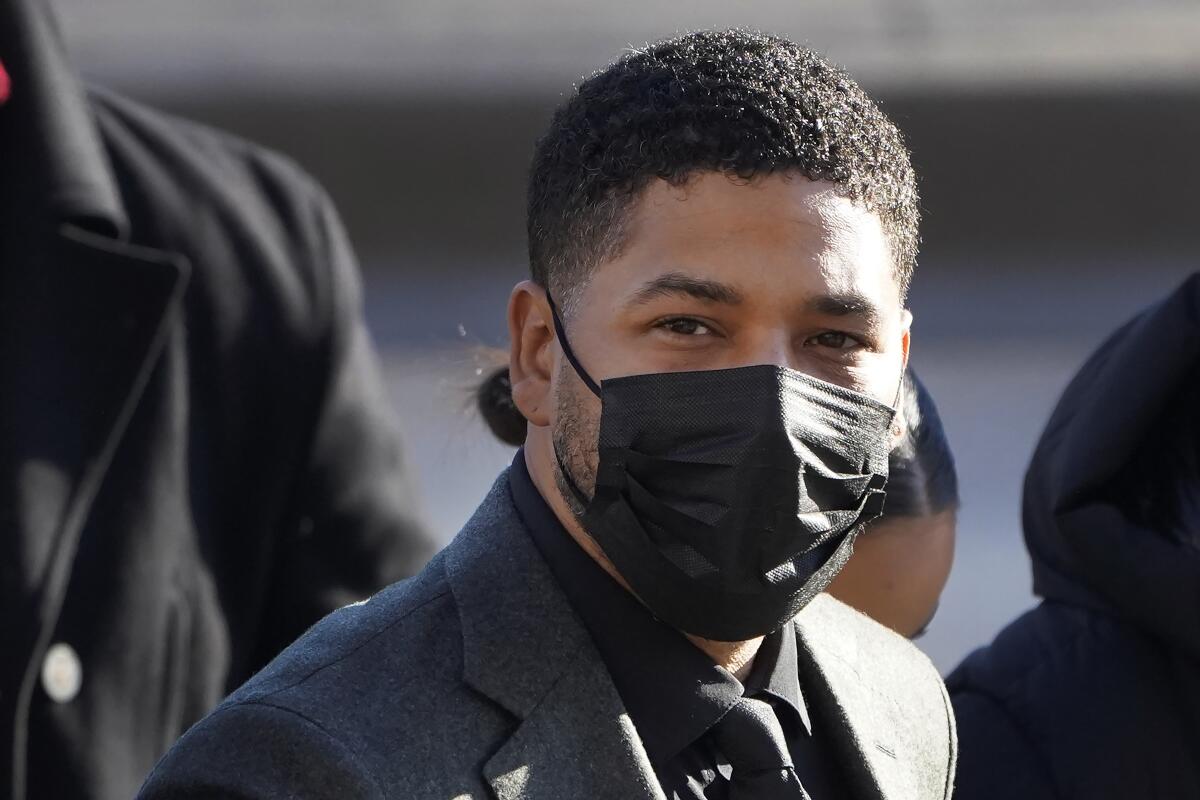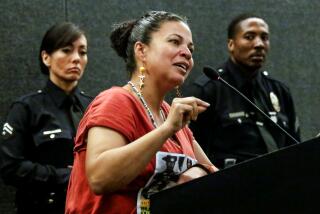Jussie Smollett testifies at trial: ‘There was no hoax’

- Share via
CHICAGO — Former “Empire” actor Jussie Smollett denied Monday that he staged an anti-gay, racist attack on himself in downtown Chicago, testifying at his trial that “there was no hoax” and that he was the victim of a hate crime in his downtown Chicago neighborhood.
Smollett, who faces charges that he lied to Chicago police about the January 2019 attack, sought to refute damaging testimony from two brothers last week. They said Smollett, who is gay and Black, orchestrated the hoax to get publicity, giving them $100 for supplies and instructing them to place a noose around his neck and yell homophobic slurs. They also said Smollett gave them the $3,500 check to carry it out.
Smollett appeared calm throughout several hours of testimony, saying he wrote the $3,500 check to Abimbola Osundairo for nutrition and training advice. Asked by his defense attorney if he gave Osundairo payment for some kind of hoax, Smollett replied: “Never.”
Attorney Nenye Uche asked again if he planned a hoax.
“No,” Smollett said, “there was no hoax.”
He also said “absolutely not” when asked if he gave Osundairo and his brother $100 to pay for supplies for the fake attack.
Smollett told jurors he had just returned from a trip and was walking home after buying a sandwich around 2 a.m. on Jan. 29, 2019, when someone yelled a racist, homophobic remark. Smollett said he turned around to confront the person, who he said towered over him.
Standing up in the Chicago courtroom, Smollett demonstrated how he said the man walked quickly toward him, then pointed to his left temple to show the jury where the man hit him.
“I would like to think I landed a punch. But I don’t know if it landed,” Smollett said. He said he slipped, and they tussled on the ground for up to 30 seconds. Smollett said he saw a second person — who he believes kicked him on his side — as that person ran away.
Smollett said he assumed the person who attacked him was white because he used a racial slur and shouted it was “MAGA country,” an apparent reference to then-President Trump’s campaign slogan, “Make America Great Again.”
The brothers, Abimbola and Olabingo Osundairo, who are Black, testified last week that Smollett instructed them to yell “this is MAGA country” during the fake assault.
Smollett said he picked up his phone and told the person he had been talking to that he “got jumped.” He noticed he had a noose around his neck as he returned to his apartment. Smollett said he removed the noose but a friend who was at his apartment called police and told him to put the noose back on so officers could see it. Smollett said he was upset police had been called because he would never have done so.
“I am a Black man in America. I do not trust the police,” Smollett said. “I am also a well-known figure at that time, and I am an openly gay man.”
Smollett said after news broke that everyone — including Trump — had an opinion about what happened, and that he hated the attention.
“I’ve lost my livelihood,” he said.
Under cross-examination, Smollett said he refused to give Chicago police his cellphone for their investigation because he wanted his privacy. Asked by special prosecutor Dan Webb if he was concerned the phone would show several calls to Abimbola Osundairo, Smollett said no.
Smollett also testified that Osundairo told him he could get an herbal steroid that encourages weight loss but is illegal in the United States “on the low” — or secretly — while he was on an upcoming trip to Nigeria.
Osundairo testified that Smollett sent him a text message about talking “on the low,” and that during the conversation Smollett asked him about helping to stage the attack. Smollett said Monday that message was in reference to the illegal steroid.
When Webb asked about Osundairo’s testimony that Smollett recruited him for a hoax, Smollett replied: “Fully false, 100% false.”
Defense attorneys have suggested the Osundairo brothers were motivated to accuse Smollett of staging the hoax because they disliked him and then saw an opportunity to make money. They suggested that after the brothers were questioned by police about the alleged attack, they asked Smollett for $1 million each to not testify against him at trial.
Smollett’s lawyers also have argued that Chicago police rushed to judgment when they brought charges against Smollett.
Smollett said he met Abimbola Osundairo in 2017 at a club, where he learned Osundairo also worked on the set of “Empire.” He said the two men did drugs together and went to a bathhouse, where Smollett said they “made out.” Over time, he said the two men did more drugs together and participated in sex acts together. Osundairo testified last week that he and Smollett didn’t have a sexual relationship.
Smollett testified that he met Abimbola’s brother, Olabingo, but that they didn’t speak, and “he kind of freaked me out.” He said Abimbola Osundairo made it seem like the men needed to “sneak off” when they were together around his brother. Smollett said he never trusted Olabingo Osundairo.
‘Empire’ actor Jussie Smollett was sentenced to five months in jail for staging an attack on himself in 2019. This Q&A explains how we got here.
Prosecutors say Smollett staged the attack because he was unhappy with the “Empire” studio’s response to hate mail he received. The letter included a drawing of a stick figure hanging by a noose, with a gun pointed at it, and the word “MAGA.”
Start your day right
Sign up for Essential California for the L.A. Times biggest news, features and recommendations in your inbox six days a week.
You may occasionally receive promotional content from the Los Angeles Times.
Brett Mahoney, who produced “Empire” in Chicago, testified Monday that law enforcement was contacted and the letter turned over to authorities. He said Smollett agreed to added on-set security, but didn’t want anyone following him home because it was too intrusive.
Smollett testified that he thought the studio was doing or suggesting too much security, such as wanting someone to drive him to and from the set. He said Abimbola Osundairo joked about becoming his security, but that he didn’t take it seriously.
Also Monday, security guard Anthony Moore said that around the time of the alleged assault, he saw a person on the ground at the end of the block and two men running, one of whom was white. Moore said he told police what he saw, but when he was later questioned by the special prosecutor, he felt pressured to change his story. Moore testified that he signed a statement that said the person was “possibly” a Black man, but that he felt “pressure and threatened to put something out there that I didn’t see.”
Under cross-examination, Moore said he only saw the man for one to two seconds. He also said he thought the men were fooling around, and that the two men were laughing as they ran by him.
Smollett, 39, is charged with six counts of felony disorderly conduct for making what prosecutors say was a false police report about the alleged attack — one count for each time he gave a report — to three different officers. The Class 4 felony carries a prison sentence of up to three years, but experts have said if Smollett is convicted, he likely would be placed on probation and ordered to perform community service.
More to Read
Sign up for Essential California
The most important California stories and recommendations in your inbox every morning.
You may occasionally receive promotional content from the Los Angeles Times.











